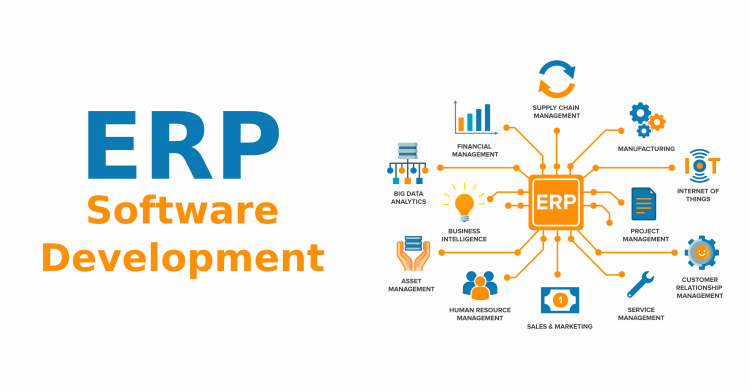In the dynamic and fast-paced business environment, companies seek efficient ways to streamline operations, enhance productivity, and maintain a competitive edge. Enterprise Resource Planning (ERP) software plays a pivotal role in achieving these objectives by integrating various business processes into a single, unified system. This article delves into the significance of ERP software development companies, their core offerings, and the strategic advantages they provide to organizations looking to optimize their operations and drive growth.
The Importance of ERP Software Development Companies
ERP software development companies specialize in designing, developing, and implementing comprehensive ERP solutions tailored to the specific needs of businesses across diverse industries. These companies combine technical expertise with industry knowledge to deliver robust ERP systems that enhance operational efficiency, facilitate data-driven decision-making, and improve overall business performance.
- Tailored Solutions for Diverse Business Needs:
- ERP software development companies provide customized solutions that address the unique requirements of various industries, including manufacturing, retail, healthcare, finance, and logistics. These solutions integrate key business functions such as finance, human resources, supply chain, and customer relationship management into a cohesive system.
- Enhanced Operational Efficiency:
- By automating and streamlining business processes, ERP systems reduce manual effort, minimize errors, and improve workflow efficiency. ERP software development companies design solutions that optimize resource allocation, enhance productivity, and ensure seamless coordination across departments.
- Real-Time Data Access and Analytics:
- ERP systems offer real-time access to critical business data, enabling organizations to monitor performance, track key metrics, and make informed decisions. Advanced analytics and reporting capabilities provided by ERP software development companies help businesses gain valuable insights and identify opportunities for improvement.
- Scalability and Flexibility:
- ERP software development companies design scalable solutions that can grow with the organization. These systems are flexible and adaptable, allowing businesses to add new functionalities, modules, or users as needed, without disrupting existing operations.
- Compliance and Security:
- Ensuring data security and regulatory compliance is paramount in ERP systems. ERP software development companies implement robust security measures, including data encryption, access controls, and audit trails, to protect sensitive information and ensure compliance with industry regulations.
Core Services of ERP Software Development Companies
- ERP Strategy and Consulting:
- Providing expert consulting services to help businesses define their ERP strategy, identify key requirements, and develop a roadmap for successful ERP implementation. This phase involves assessing current systems, conducting gap analysis, and outlining a clear plan for ERP adoption.
- Custom ERP Development:
- Designing and developing custom ERP solutions tailored to the specific needs and workflows of the organization. This includes creating user-friendly interfaces, developing backend systems, and integrating various business processes into a unified platform.
- ERP Integration:
- Integrating the ERP system with existing enterprise applications, such as CRM, SCM, HRM, and financial systems, to ensure seamless data flow and interoperability. ERP software development companies ensure that all business functions are connected, enabling efficient information sharing and collaboration.
- Implementation and Deployment:
- Managing the implementation and deployment of the ERP system, including data migration, system configuration, user training, and go-live support. ERP software development companies ensure a smooth transition and minimize disruption to daily operations.
- Maintenance and Support:
- Providing ongoing maintenance and technical support to ensure the continuous performance and reliability of the ERP system. This includes regular updates, bug fixes, performance optimization, and user support to address any issues that arise.
- Data Analytics and Reporting:
- Developing advanced analytics and reporting tools that enable businesses to gain insights from their data. ERP software development companies create dashboards, reports, and data visualization tools that help organizations monitor performance, track key metrics, and make data-driven decisions.
Strategic Benefits of Engaging ERP Software Development Companies
- Streamlined Business Processes:
- ERP systems automate and streamline various business processes, reducing manual effort, minimizing errors, and enhancing operational efficiency. This leads to improved productivity, faster response times, and better resource utilization.
- Improved Decision-Making:
- Real-time access to accurate and up-to-date data enables organizations to make informed decisions. Advanced analytics and reporting capabilities provided by ERP systems help businesses identify trends, monitor performance, and make strategic decisions that drive growth.
- Enhanced Collaboration and Communication:
- ERP systems facilitate seamless communication and collaboration across departments by providing a unified platform for information sharing. This improves coordination, reduces silos, and ensures that all teams are aligned and working towards common goals.
- Increased Agility and Scalability:
- ERP solutions are designed to be scalable and flexible, allowing businesses to adapt to changing market conditions, expand operations, and introduce new products or services. This ensures that the ERP system can grow with the organization and support its evolving needs.
- Regulatory Compliance and Data Security:
- ERP software development companies implement robust security measures and ensure compliance with industry regulations. This protects sensitive business data, minimizes risk, and ensures that the organization adheres to legal and regulatory requirements.
- Cost Savings:
- By optimizing business processes, improving resource utilization, and reducing operational inefficiencies, ERP systems help businesses achieve significant cost savings. This leads to improved profitability and a better return on investment.
Best Practices for Engaging ERP Software Development Companies
- Define Clear Objectives and Requirements:
- Clearly articulate the business objectives, key requirements, and expected outcomes for the ERP system. Engage stakeholders from different departments to ensure alignment and address diverse needs and expectations.
- Choose the Right Development Partner:
- Select a reputable ERP software development company with extensive experience, industry knowledge, and a proven track record of successful projects. Evaluate their technical capabilities, portfolio, and client testimonials to ensure they can deliver high-quality solutions.
- Prioritize User Experience and Usability:
- Design intuitive user interfaces and workflows that prioritize user experience and usability. Conduct usability testing, gather feedback from end-users, and iterate on design improvements to enhance adoption and satisfaction.
- Ensure Data Security and Compliance:
- Implement robust security measures and ensure that the ERP system complies with industry regulations. Address potential vulnerabilities, implement encryption, and establish secure authentication and access controls to protect sensitive data.
- Foster Collaboration and Communication:
- Maintain open communication and collaboration between the development team and business stakeholders throughout the project lifecycle. Regular updates, feedback sessions, and milestone reviews ensure alignment, address concerns, and facilitate successful project execution.
Conclusion
ERP software development companies play a crucial role in transforming business operations by delivering customized, integrated solutions that enhance efficiency, improve decision-making, and drive growth. By leveraging the expertise of these companies, organizations can optimize their processes, gain valuable insights, and achieve a competitive edge in today’s dynamic business environment. Engaging with experienced ERP software development partners ensures that businesses can successfully navigate the complexities of ERP implementation, unlock new opportunities for innovation, and achieve sustained success. Embracing ERP technology empowers organizations to adapt to changing market conditions, respond proactively to challenges, and create lasting value for their stakeholders.








